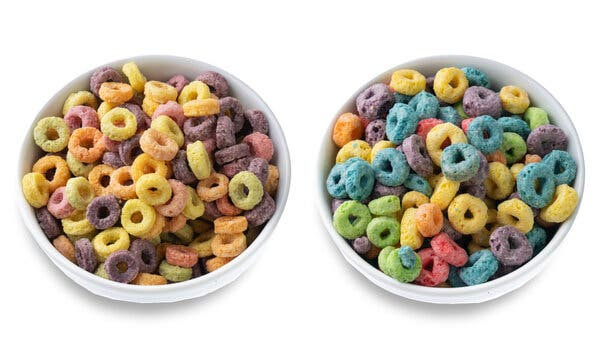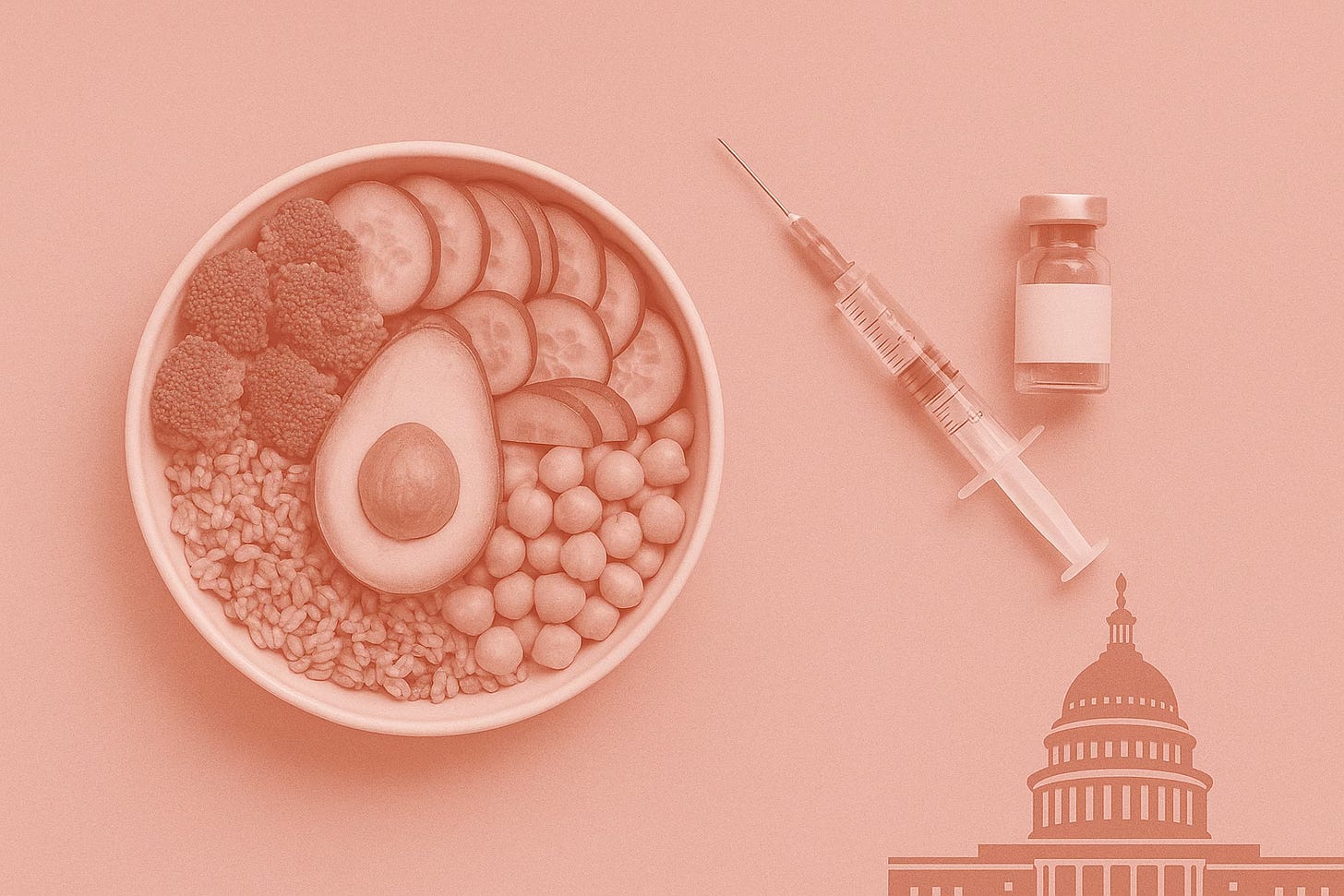The Food-Pharma Civil War at HHS
MAHA in the cabinet
This is my first paywalled post. If you want to read the whole thing (and I think it’s worthwhile!), you should subscribe. My posts moving forward will be a mix of free and paid. Thank you for your support, regardless of subscription type.
My aim with this newly independent Acute Condition is to leverage my unique experience in policy, healthcare, and tech. I think MAHA is a particularly interesting topic because it touches on all of those — it’s a movement that’s affecting health policy, and the coalition contains more than a few people from San Francisco tech world (Nicole Shanahan, ex-wife of Google cofounder Sergey Brin, being perhaps the most prominent). And if you take a broad view of what constitutes “MAHA,” there are quite a few companies currently building in this space.
Robert F. Kennedy, Jr. was sworn in as Secretary of Health and Human Services in February. Definitely unexpected, definitely a little weird, especially by the standard of previous secretaries of HHS. During Trump’s first term, Alex Azar served as HHS secretary to generally positive reviews. He had a background in pharma and biotech, and he didn’t really make news.
Kennedy, on the other hand, has embraced making news. He was an unorthodox pick for the largest federal agency by budget (although the vast majority of that budget goes toward Medicare and Medicaid spending, not HHS administration). He negotiated his position in the administration in return for dropping out of the presidential race, where he was running as an independent candidate, and endorsing Donald Trump. He brought with him a coalition of the crunchy left and carnivore diet-curious right, which reflects Kennedy’s background as an environmentalist, vaccine skeptic, and purveyor of roadkill.
This coalition began referring to itself as MAHA (for Make America Healthy Again) and seemed ready to score some obvious and real victories: longitudinal nutrition research funded from neutral, government sources (nearly 1 in 7 nutrition studies published in major journals have industry ties, and those with industry ties are much more likely to have an industry-favorable result); research into chronic disease causes; working across agencies on campaigns to reduce the overweight and obesity that is afflicting nearly 70% percent of active duty service members. These are all goals in line with the Make America Healthy Again Commission, which the Trump administration formed in February.
So far, though, the only victories seem to be stemming from the social media power of the loose MAHA coalition, rather than the power of HHS.
For example, it briefly seemed that Kennedy’s FDA might ban artificial, petroleum-based dyes from cereal targeted at children (especially as cereal manufacturers already produce the same cereal with plant-based dyes in Canada and other countries). There’s a whole interesting side note here on the availability of natural dyes and how supply chains for plants with colorful byproducts might be affected — but the important part is that so far the FDA still allows synthetic dyes. Some companies may switch to plant-based dyes willingly to reflect what seems to be growing consumer demand for naturally dyed products, but again, this is on the basis of the MAHA movement, not the power of the agency itself.

In fact, the first report that the MAHA Commission produced seems to have been written using ChatGPT or another AI tool, with multiple broken links, incorrect interpretations of data, and several citations that don’t exist.
So what’s keeping MAHA from really making progress?
I would argue that it stems from a fractured movement, with different camps that aren’t willing to work together. This split has been increasingly obvious over the last few weeks.
Food vs. pharma
A recent report from Baron Public Affairs looked at the most powerful influencers in the MAHA camp and found a split between those interested in primarily food and diet, and those who would rather have the agency prioritize concerns over pharma. Among those influencers focused primarily on pharma, Baron highlighted stances on vaccines and GLP-1s, with vaccine skepticism being primarily directed toward the Covid vaccine and the government’s vaccine injury compensation program. Among those targeting food, most focused on the USDA food pyramid, seed oils, and big agriculture.
I would describe myself as mildly crunchy, in that I avoid ultraprocessed foods, prefer whole milk and yogurt, and I’m a bit of a truther on the amount of protein someone who’s working out regularly needs (I feel better when I eat more protein! Sorry!). I think MAHA has something real to say about food.
Corporations are trying to make food as ultra-palatable — and addictive — as possible. Nutrition standards are influenced by lobbyists. Determining which diet is “healthiest” is so complex and multifactorial that grabby media headlines stemming from small or incomplete studies (see: the example of red wine) confuse people all the time.
Nutrition in America is closely tied up in agriculture, which is in turn tied up in the livelihoods (and mental health) of many Americans, as well as climate change, water usage, international trade, and — to some extent — our cultural identity as a nation of farmers. For that matter, you could argue that nutrition policy in the U.S. is linked to how we allocate power among Congresspeople — those from sparsely populated states (which are often agricultural) have outsized power with votes, which they use to their states’ best interests (which is not always in the best interest of nutrition science).
Nutritionist Dr. Marion Nestle (author of the must-read book Food Politics) put it well when she argued to the New York Times that MAHA is onto something with food, but that, for the movement, food is almost taking the place of a god: “Lots of people don’t have that kind of religion anymore, so food is a substitute in some ways.” She argues much the same of what I do above — nutrition policy is too closely affected by money and lobbying — but concludes after decades of study that a well-rounded diet with everything in moderation is best.
As with any radical movement, once you accept the fairly straightforward central premise — that food manufacturers want you buy more, that there is an illusion of choice, and that pharma companies do indeed go to great lengths to protect their profits — it’s an easy mental leap to conspiracy theories (even when there’s a lack of evidence for said conspiracy theories).
On that note, I don’t think MAHA is even close to the right criticisms of pharma. In fact, I think that conflating the issues with food and pharma weakens both arguments and misses the point entirely with pharma.
Consolidation in pharma is tied to higher prices (for innovative drugs) and weaker supply chains (for generic and me-too drugs). Perhaps you could argue that pharma companies are incentivized to keep Americans on lifelong medications rather than inventing wonder drugs — but wonder drugs actually bring in far more money, especially given that statins, NSAIDs, beta blockers, etc. are all generic. I’ve argued that our generic drug supply chains are nearing a crisis point, while our wonder drugs are very expensive. It frustrates me that legitimate goals like strengthening our supply chains, incentivizing research into new antibiotics, or improving the grant process for scientific research fall by the wayside with the MAHA crew.
MAHA civil war
The various parts of the MAHA coalition were able to hold it together for…about three months. Then in early May, Trump nominated Casey Means, MD, cofounder of Levels and author of the book Good Energy, for surgeon general. The MAHA infighting spilled into the open, with Nicole Shanahan, who bankrolled and was Kennedy’s VP pick for his short-lived third party presidential run, publicly stating that Kennedy had promised her that he wouldn’t allow Means to be involved at HHS. Laura Loomer, a fringe far-right influencer who nonetheless has the ear of the president and who likely played a role in tanking Trump’s first pick for surgeon general, came out against Means for her general support of vaccines. Megyn Kelly called it a “MAHA civil war.”
This civil war is ongoing. Means remains the pick for surgeon general, with a date for her confirmation hearing yet to be determined. The anti-vaccine side of MAHA thinks that someone has talked Kennedy out of going full-tilt against the vaccines. The more conspiracy-minded allege that it’s the deep state, but my guess is that it would be White House Chief of Staff Susie Wiles, whose job it is to keep the various parts of the administration rowing in the same direction — and spending time on an ill-fated internecine war between different conspiracy factions is the opposite of that.
The future of HHS
So is Kennedy’s HHS leading the country to a future of MAHA?
Of all of Trump’s big-name appointees for the major agencies, Kennedy has seemed to balance flashy press conferences with not taking over the news cycle in a way that would be anathema to the Trump administration. DHS head Kristi Noem failed to strike that balance with her seemingly made-for-Trump video style when she traveled to El Salvador. DOJ head Pam Bondi similarly fell short when the heavily-hyped release of the JFK assassination files and Jeffrey Epstein files failed to reveal anything new.
But Kennedy is also setting himself up to over-promise and under-deliver to Trump’s electoral base. He claimed that he’d be able to release a report by September uncovering the environmental cause of autism, so “we’ll be able to eliminate those exposures.” Needless to say, he’s already pushed back the deadline.
MAHA and MAGA
The Trump/MAGA coalition is also a big tent coalition with some highly publicized differences — evangelicals accepting Trump’s multiple affairs and divorces, rural MAGA supporters and stock-holding Wall Street bros, white supremacists and a record number of Latino voters for Trump. But to…I think everyone’s…surprise, this coalition has proved stable. The MAHA coalition could have been the same. But so far the food vs. pharma battles (and the vaccine-focused people within the pharma faction) seem to be weakening the whole project.
For the MAGA coalition, these disparate groups are brought together with the goal of electing Trump. But for MAHA, the end goal was not to get Kennedy appointed to lead HHS and trust him to get things done. Meanwhile, Kennedy serves at the pleasure of the president — he’s currently torn between the factions of his own movement and the need for the administration to keep things on a more even keel to get things accomplished.
Trump is the end-all-be-all of MAGA. Kennedy is not in the same position for MAHA. Instead, now that he’s in the government, he’s in the impossible position of proving something that can’t be proven, or seeming like he’s a deep state mark himself. It’s much easier for someone like him to be in the opposition than in a position of power. And the real goals of the MAHA movement —on both the food and the pharma side — seem likely to fall far short as a result.


Nice piece. MAHA is so annoying and incompetent that they pushed me to be skeptical of anything that has the term 'wellness' in it.